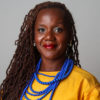CSSH’s Africana Studies program hosted its second annual bell hooks symposium on February 3 with the theme “Black Feminism, Black Freedom.” The first bell hooks symposium took place last February, two months after hooks passed away. Both symposiums allowed for reflection and celebration of the legendary thinker, teacher, and feminist.
Régine Jean-Charles, director of Africana studies, dean’s professor of culture and social justice and professor of Africana studies and women’s, gender and sexuality studies, was the organizer of the event. In her opening remarks, she said that this year’s theme revolves around the idea of Black feminism being a “freedom project from its very inception.” She also noted that this symposium begins with a lowercase ‘s,’ signifying that the event’s focus was on presenting personal reflections on the intersections of Black feminism and Black freedom rather than academic literature on the subject.
Demita Frazier, a founding member of the Combahee River Collective, Northeastern graduate and lifelong Black feminist, joined virtually and discussed how she began to understand the importance of Black freedom from a very young age. Frazier was only six years old when she was first told about white supremacy and white superiority from her mother. Growing up in 1950s and 1960s Chicago, Frazier was exposed to the civil rights movement early on and soon grew to become a part of it. With a self-proclaimed addiction to the “pursuit of freedom,” she has dedicated her life to undermining heterosexist patriarchies and white supremacy.
Jovonna Jones, Assistant Professor of African American Literature and Culture at Boston College, gave a passionate presentation called “Freedom Is,” during which she explained how she conceptualizes freedom in a Black feminist context. Drawing from lessons taught by singer Nina Simone, bell hooks, author Tina Campt and her own students, Jones arrived at the conclusion that freedom is many things; it’s having no fear and embracing a new way of seeing, it’s linked to our pleasures and passions, and it’s imagining a new world—a safer world.
Asia Potts, an English PhD student, discussed storytelling, specifically Zora Neale Hurston’s 1937 novel, “Their Eyes Were Watching God,” as her first introduction to Black feminism. The novel was a foundational text for Potts and inspired her to study contemporary Black literature and Afrofuturism, which uses a Black cultural lens to examine the future and alternate realities. Potts’ work occupies “creative and critical spaces” and explores concepts of how “Black women claim and occupy space.” She acknowledged that the work of Frazier, Hurston and novelist Toni Morrison allow her to be seen as the “after;” the result of their decades of efforts to change the world for Black women. Despite that, she also sees herself as a “before”: a teaching assistant, a resident assistant, a mentor to students and to young girls of color who don’t even exist yet.
The symposium’s first panel was a reflection of how Black feminists conceptualize freedom and how they have imagined and strived for it. Black freedom is always a priority for these feminists, who will continue to fight for safety, for liberty, and for equality.
Read more about this year’s bell hooks symposium in The Huntington News and Northeastern Global News. The complete recording of the symposium can be found here.





